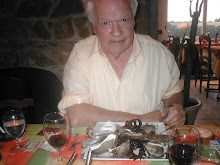I didn't go to church this Easter. I don't go to church. I was brought up a Methodist, and I still love and sing (anywhere) the great Methodist hymns. But I don't like the word --Method-ist--just as I don't like -isms in general, and --well, one can't step into the same river twice. The Church of England has never appealed to me; it's too genteel, too unemotional; I hate boys' choirs, those little white frocks they wear; equally the adult males, in their big white frocks, warbling away. Above all, they have tragically thrown away that magnificent treasury for the spirit and the heart, the King James' Bible and Cranmer's prayer book. I can't forgive them that. I don't want Christianity in civil service English. I also don't want happy-clappy.
I would like Petersburg's Mariinsky Cathedral, the 'Marine Cathedral', transferred to Truro. Magnificent mixed choir, thunderous blackbearded priests. Some billionaire should buy it, as they do football clubs, and bring it here. Failing that, I'd probably enjoy some mostly black, Hot Gospel church. All that exuberance, and marvellous harmonised singing.
I do have a religious sense. Wittgenstein: 'Not how the world is, but that it is, is the mystery.' We may as well call that mysterious mystery, that unknown unknown, God. For us, for our western culture and time, Christianity became our preferred symbol for the source of existence. So I believe in Christianity just as I believe in a rose as a symbol of beauty, or the moon as a symbol of woman.
Elsewhere, Buddhists, Muslims, etc. have their own preferred symbols for the mystery. Atheists don't have symbols for it, except perhaps some mathematical formula. Of course atheists can be good men and women, but somehow the people who have moved me most, because they seem to have a deeper grounding, have been religious --e.g. Akhmatova, Osip and Nadezhda Mandelstam, T.S.Eliot, Yeats, Pasternak, Solzhenitsyn. Also my mother, whose simple Christian sayings come through to me often, and rarely fail to 'restore my soul'. And my father, who said, days before his unexpected death after an operation, 'Amy, I want you to know, if anything happens to me, my way is clear'. Incidentally, it would have been my mother's 105th birtday on Easter day.
Religious words that move me deeply:
Dame Juliana of Norwich: 'Sin is behovely; and all shall be well, and all shall be well, and all manner of thing shall be well.'
Dante, the last line of the Divine Comedy: 'The Love that moves the sun and the other stars'.
Eliot, in Four Quartets:
'Who then devised the torment? Love.
Love is the unfamiliar Name
Behind the hands that wove
The intolerable shirt of flame
Which human power cannot remove.
We only live, only suspire
Consumed by either fire or fire.'
If anyone can find me a phrase or sentence in Dawkins that I will want to cherish, let me know.
 Rt.Hon.Eric Honegger, MP
Rt.Hon.Eric Honegger, MP


